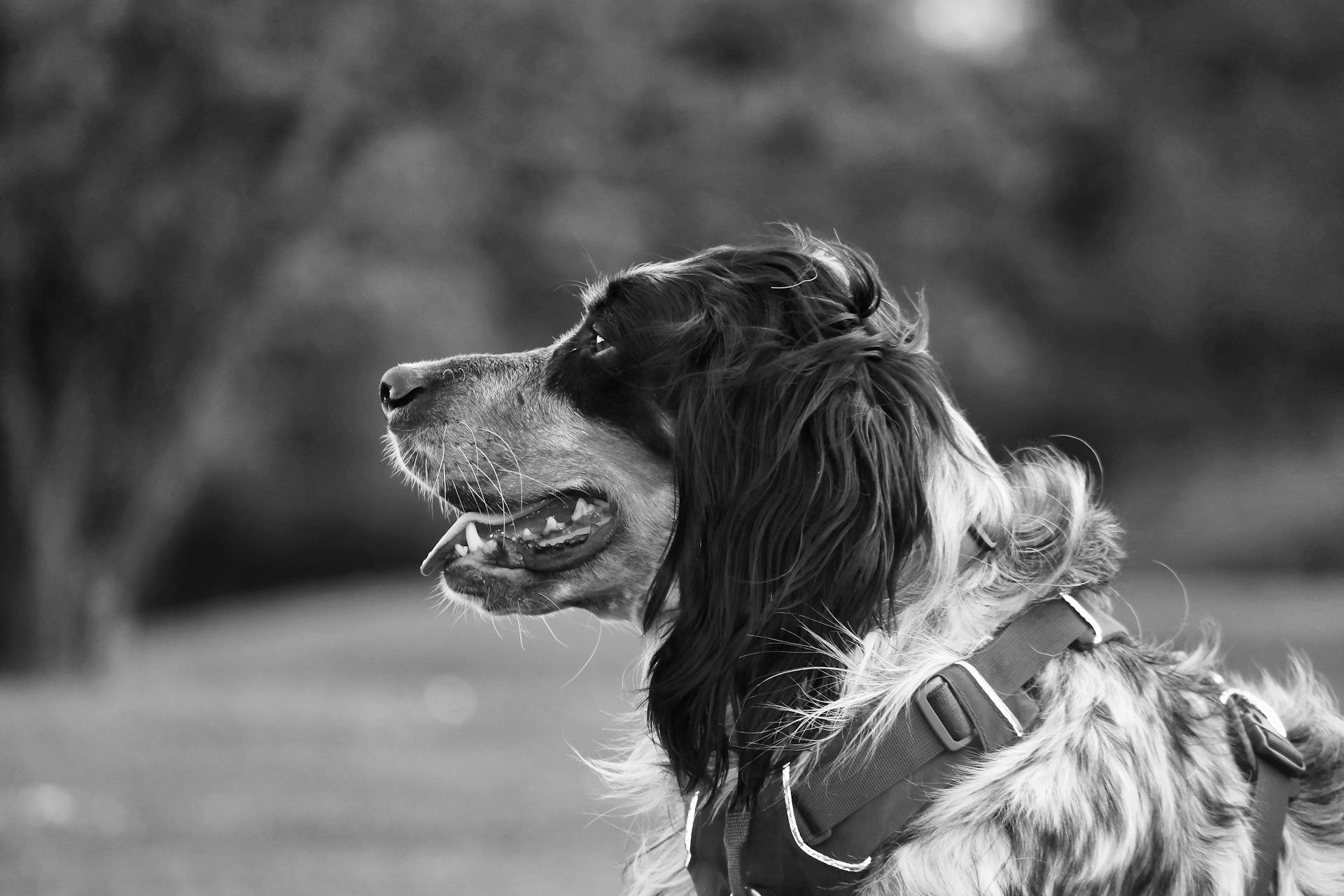
The English Mastiff is a gentle giant, making them an excellent addition to families with children. They are known for their patient nature, which is essential for households with kids.
With proper training and socialization, English Mastiffs can thrive in family environments. Their calm demeanor helps to create a peaceful atmosphere, perfect for families who value a relaxed home life.
English Mastiffs are not high-energy dogs and don't require a lot of exercise to stay happy and healthy. A daily walk and some playtime are enough to keep them satisfied.
Overview
English Mastiffs are big dogs that are full of love and have a playful and friendly personality.
They don't have a high tendency to bark, which is a bonus for many dog owners.
Mastiffs are intelligent and learn quickly, but they can be independent and require patience and consistency in training.
They're sensitive souls who pick up on their human companions' emotions, so they'll often try to offer comfort if they sense you're upset or distressed.
Mastiffs are loyal and affectionate towards their family members, making them incredible companions for the right individuals or families.
With the right care and environment, Mastiffs can bring joy, security, and a lot of love to a home, but they do need space, exercise, and high-quality food to thrive.
Key Characteristics
English Mastiffs are known for their gentle and loyal nature, making them excellent family pets. They are often described as "gentle giants" due to their large size and calm demeanor.
One of the defining characteristics of a Mastiff's temperament is their innate protective instinct. This breed is fiercely loyal to its family and will go to great lengths to guard their loved ones.
Mastiffs are not known to be barkers, preferring to observe quietly. Their mere presence, given their size, is usually deterrent enough for any intruders, eliminating the need for excessive barking.
Male Mastiffs typically have a larger build and possess a more commanding presence than females, making them a great choice for owners seeking a more intimidating guard dog.
Here are some key characteristics of the English Mastiff temperament:
Mastiffs are intelligent but can sometimes be stubborn and independent, requiring patient and consistent training from an early age.
Social and Living Needs
English Mastiffs are social creatures that thrive on companionship, particularly with their families or familiar faces.
They can form strong bonds with their loved ones and enjoy being part of family activities. This is especially true if they're introduced to new people and places at a young age.
Mastiffs are adaptable living companions that can adjust to various living conditions, including apartments, as long as they have regular walks and occasional open spaces to stretch and play.
Their size requires ample space, but with proper care and attention, they can live comfortably in smaller spaces.
Training and Lifestyle
English Mastiffs are intelligent dogs, but they can be stubborn and independent, so patience and consistent training from a young age are essential for handling them.
They require daily exercise to maintain their health and well-being, which includes regular walks and play sessions.
Mastiffs are not high-energy dogs, but they do need adequate exercise to prevent obesity, a common problem in the breed. They're also quite content lounging with their families.
Proper training and socialization are crucial for Mastiffs, especially due to their giant size, and should include preventing jumping and leash-pulling.
Active Lifestyle
Mastiffs may not be hyperactive dogs, but they still need daily exercise to stay healthy and happy. This means committing to regular physical activity, such as walks and play sessions.
People who are willing and able to provide this kind of exercise are well-suited to Mastiff ownership. They'll need to ensure their Mastiff gets enough physical and mental stimulation to prevent boredom and destructive behavior.
Daily walks and play sessions are essential to prevent obesity, a common problem in the breed. This means finding time to take your Mastiff out for a stroll or playtime in the yard every day.
Mastiffs are content lounging with their families, but they still need regular exercise to stay healthy. This balance between activity and relaxation is key to happy and healthy Mastiff ownership.
Here's an interesting read: Healthy Bull Terrier
Patient Trainer
Mastiffs are intelligent dogs, but they can be stubborn and independent. They require patient and committed owners who can provide consistent training and socialization from a young age.

To handle a Mastiff, you need to be patient, as they can be stubborn at times. Consistent training and socialization practices will make a big difference in their behavior.
Mastiffs are not hyperactive dogs, but they still need daily exercise to stay healthy. Regular physical activity, like walks and play sessions, is essential for their well-being.
Proper training and socialization are crucial for Mastiffs, especially due to their giant size. Careful attention should be given to preventing jumping and leash-pulling.
Mastiffs are natural protectors, but they can become overprotective if not socialized well. Socializing them will help their natural protectiveness be appropriate around visitors.
To save your furniture, consider dog-proofing your home for a Mastiff. They have a strong tail that can sweep items off tables, and they're tall enough to sample your dinner from the dining room table.
A different take: Dogo Argentino Natural Ears
Owner and Family Considerations
If you're considering bringing a Mastiff into your family, it's essential to think about your lifestyle and living situation. Experienced dog owners who have handled large breeds before are ideal candidates for Mastiff ownership.
You'll want to consider the space you have available, as Mastiffs require room to move comfortably without feeling cramped. A spacious living environment is preferable, especially if you're planning to bring a Mastiff into your home.
As for family dynamics, Mastiffs are generally gentle and patient with kids, making them excellent family companions. However, due to their size, supervision during interactions with small children is crucial.
Experienced Dog Owner
As an experienced dog owner, you know that certain breeds have specific needs and behaviors that require a certain level of expertise to handle properly. Mastiffs, for instance, are a large breed that respond best to owners who have experience with similar-sized breeds.
Their size and strength can be intimidating, especially for inexperienced owners, making it challenging for them to establish leadership and provide the necessary care. Due to their size, supervision during interactions with small children is crucial.
Mastiffs are not inherently aggressive, but they do possess a natural protective instinct that makes them excellent guard dogs. Their imposing presence alone often serves as a deterrent.
Training a Mastiff requires patience due to their independent streak, and consistency and early training are crucial for best results. They are intelligent and capable learners, but they can be challenging to train for inexperienced owners.
A spacious living environment is preferable for Mastiffs due to their large size, and they need room to move comfortably without feeling cramped.
Male vs Female Comparison
Male Mastiffs have a larger size and more dominant presence, making them a strong protective force for their families.
Their size and dominance can be overwhelming for some owners, especially those with less experience, so it's essential to consider this aspect before bringing a male Mastiff home.
Males are not typically described as having strong maternal instincts, unlike their female counterparts.
Female Mastiffs, on the other hand, are often easier to train due to their less dominant nature.
Their nurturing and caring personalities make them excellent companions for families with children, providing a sense of comfort and protection.
However, females may experience mood fluctuations during their heat cycles, which can affect their behavior and require careful attention from owners.
Ultimately, the choice between a male or female Mastiff depends on what the prospective owner is looking for in a companion, and understanding these subtle differences can help in selecting a pet that aligns with their lifestyle and expectations.
Care and Maintenance
English Mastiffs are massive dogs that require regular exercise to stay happy and healthy. They need at least 30 minutes of gentle exercise per day, such as a leisurely walk or playtime in a securely fenced area.
Their short coats are relatively low-maintenance, but they still need regular brushing to remove loose hair and distribute skin oils. English Mastiffs shed heavily, especially during shedding season, so be prepared for regular grooming sessions.
English Mastiffs are prone to joint issues, so it's essential to keep them at a healthy weight through a balanced diet and regular exercise. Obesity can exacerbate joint problems, making it crucial to monitor their food intake.
Their massive size means they can be clumsy, so be patient with them as they learn to navigate their surroundings. With time and practice, they'll become more agile and confident.
English Mastiffs are generally quiet dogs, but they do bark occasionally to alert their owners to potential threats or to express excitement. They're not excessive barkers, but they do need regular training to minimize unwanted barking.
Their calm demeanor makes them an excellent choice for families with children, as they're patient and gentle with kids. However, it's still essential to supervise interactions between dogs and young children to ensure everyone's safety.
Frequently Asked Questions
Can English mastiffs be aggressive?
English Mastiffs can exhibit aggression in some lines, but proper socialization can help prevent or minimize this behavior. Early and ongoing socialization is crucial to developing a stable temperament in this breed.
Featured Images: pexels.com


